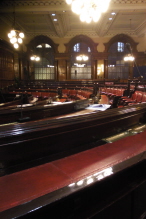Disciplining councillors
- Details
 The High Court has handed down an important ruling on the obligation to discipline councillors under the code of conduct procedure. Richard Clayton QC and Jonathan Goolden look at the lessons for local authorities.
The High Court has handed down an important ruling on the obligation to discipline councillors under the code of conduct procedure. Richard Clayton QC and Jonathan Goolden look at the lessons for local authorities.
The recent decision in R(Harvey) v Ledbury Town Council [2018] EWHC 1151 (Admin) shows that local authority’s governance arrangements are centre stage when imposing disciplinary sanctions on councillors. A local authority will be acting unlawfully if it tries to by-pass the Code of Practice Procedure under the Localism Act 2011 when seeking to address alleged misconduct by members.
Section 28 of the 2011 Act makes detailed provision for the Code of Practice procedure. Cllr Harvey argued that the 2011 Act required that allegations under s 28(9)(b) must only be dealt with under “arrangements” made under s.28(6), so that a complaint made against her had to addressed exclusively under the local authority arrangements.
Cllr Harvey was a prominent town councillor and sat on three of its main committees. Complaints of bullying and harassment were made against her by the Town Clerk and Deputy. The Town Council decided to follow guidance adopted by at least one county association of local councils, which said that it was appropriate to deal with allegations of bullying under a grievance procedure, because issues concerning employee relations should be addressed more expeditiously than the Code of Conduct process contemplated. Cllr Harvey disagreed with the idea that employee issues should be handled under the grievance procedure and self-referred a Code of Conduct complaint to the monitoring officer of Herefordshire Council (the principal authority for the area).
Nevertheless, the Town Council proceeded under its grievance and appeals procedure, found against Cllr Harvey and imposed various disciplinary sanctions. She could not serve on any of the Town Council’s committees, sub-committees, panels or working groups and could not represent the Town Council on any outside body. These measures were maintained even after external investigators instructed by Herefordshire Council’s monitoring officer found that Councillor Harvey had not failed to follow the Town Council’s Code of Conduct.
Cllr Harvey brought judicial review proceedings, claiming that the Town Council was acting ultra vires. Her starting point was the Town Council’s Code of Conduct applied to Members “when they are acting in that capacity” and that the Council would be acting unlawfully if it refused to deal with an allegation amounting, in substance, to breaching the Code because the someone misunderstood the reality of the complaint or cherry picked whether a particular process fell within the scope of the Code.
Cockerill J found for Cllr Harvey. That decision was in line with previous authorities. In R (Taylor) v Honiton Town Council [2016] EWHC 3307 (Admin) a town council had imposed sanctions on the claimant for breaching its code of practice, and Edis J held that the important safeguard of involving independent persons in the process would be frustrated if a parish council could reconsider the principal authority’s decision and substitute its own decision, if it chose to do so. Similarly, in Hussain v Sandwell Metropolitan Borough Council [2017] EWHC 1641 (Admin) the council’s Audit Committee undertook a “pre-formal investigation” to determine whether there was substance in the allegations against a councillor before instituting the formal investigatory procedure under s 28 and Green J rejected that submission that the local authority did not have the power to conduct the pre-formal investigation. On the other hand, Cockerill J rejected the approach of the Court of Appeal in R (Lashley) v Broadland DC (2001) 3 LGLR 25 on the ground that this decision concerned a different and earlier statutory regime.
In Harvey Cockerill J emphasised that the s 28 process contemplates a potentially a four stage process: (i) making an allegation (ii) (optionally) a non-formal investigatory or mediation stage or other relevant steps being taken (eg criminal proceedings) (iii) a formal stage, involving an independent person, leading to a decision on breach (iv) (if breach is found) a formal stage, again involving the independent person, dealing with action. She stressed that that an independent person must be involved and consulted under the 2011 Act procedure - both at the decision-making (breach finding) stage and the sanction stage. Cockerill J decided that it was essential to ensure the safeguard at the key stages of decision-making and action, while leaving the possibility of more flexible approaches in appropriate cases.
We, therefore, would, underline that a local authority will be on risk if it tries to discipline councillors outside the governance procedures laid down by the Localism Act.
Richard Clayton QC is a barrister at Ely Place Chambers and Jonathan Goolden is a partner at Wilkin Chapman LLP. Richard can be contacted on 020 7400 9600 or This e-mail address is being protected from spambots. You need JavaScript enabled to view it . Jonathan, who was the external investigator in this case, can be reached on 01472 262626 or This e-mail address is being protected from spambots. You need JavaScript enabled to view it .
Head of Legal Services / Deputy Monitoring Officer
Governance Officer/Company Secretary
Locums
Poll

















